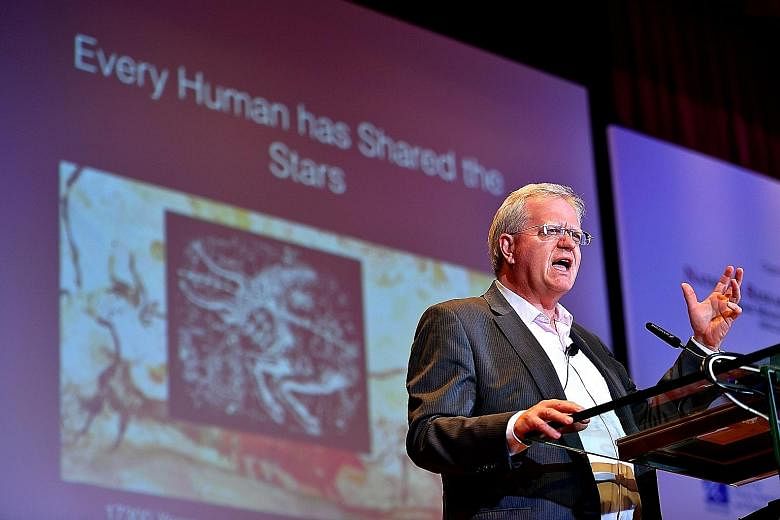As a boy, Professor Brian Schmidt used a "cheap telescope" his parents bought him to look at the starry Alaskan sky.
When he was 12, he saw his first solar eclipse, and in his 40s, he became a Nobel laureate for outstanding research on the universe.
Prof Schmidt, who specialises in physics and astronomy, won the 2011 Nobel Prize in physics, together with two other astronomers, for discovering that the universe was expanding at an accelerating rate.
They were part of the High-Z Supernova Search Team at the Australian National University in 1995. Through their observations of distant supernovae - or exploding stars - they saw that since six billion years ago, these have been moving farther and farther away from one another.
And the farther they were, the faster they moved away, said Prof Schmidt, 50, who was born in Atlanta but grew up in Alaska. He is married with two children.
The scientists' findings in 1998 made waves because they disproved a long-held belief that the universe was slowing down.
Prof Schmidt described it as an "exciting and busy" time.
"The project was initially a lot of hard work, with no idea of knowing what we would discover," he told The Straits Times in a phone call early this month. "In the end, we weren't sure what to believe because it seemed so crazy."
The experiment - started to measure the weight of the universe - involved 31/2 years of measuring how far objects in space, such as planets and stars, were from one another.
Astronomers struggle with measurement, so they use brightness instead, Prof Schmidt explained.
By measuring the brightness of the supernovae, the team was surprised to find out that the stars were travelling farther and faster - a discovery that led the scientists to their prize-winning research.
"It took years to finally sink in that it wasn't a mistake," Prof Schmidt said.
Twenty years on, there is little doubt about the team's work.
Life after winning the Nobel prize has allowed Prof Schmidt to meet many "new and interesting people", leaving almost no time to sit at his desk any more, he quipped.
He is currently the vice-chancellor of the Australian National University, which is working on creating the first digital map of the entire Southern night sky.
Prof Schmidt is in Singapore for the sixth Global Young Scientists Summit (GYSS), a five-day event that will see young scientists from 24 countries rubbing shoulders with 20 award-winning scientists.
In his plenary lecture at the opening ceremony on Sunday, he spoke about knowledge from the beginning of time, and how the human race advanced from there, passing information down from generation to generation.
"As humans, we wonder, we care, we think. Indeed, it's an aesthetic process of being human to just be curious," he said, urging his audience to stay eager to learn.
Asked what his goal at the GYSS is, Prof Schmidt said he hopes to "help demystify how science works" for younger researchers there.
"They might be confused about us, and think that we're geniuses that they've never seen before... but I want to help them understand the fields we work in and give them confidence," he had said via telephone.
Echoing this in his lecture, he said: "Each of you has the opportunity to contribute to those discoveries, and you may even well be a part of it."

